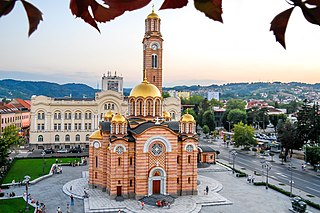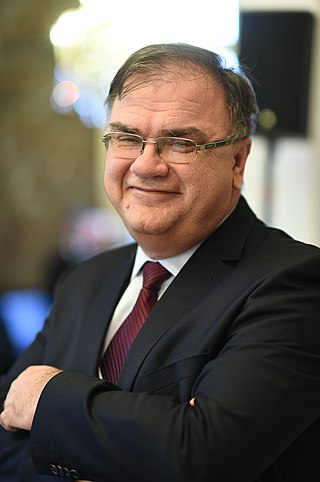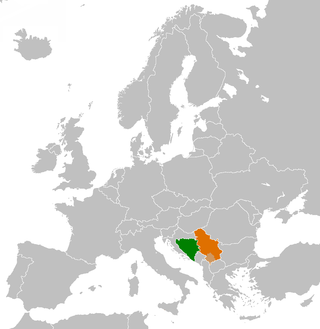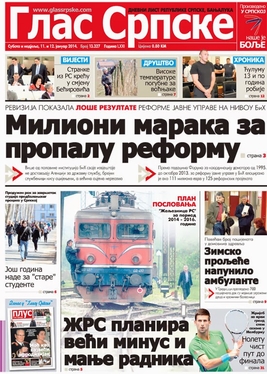
The Armed Forces of Bosnia and Herzegovina is the official military force of Bosnia and Herzegovina. The BiH armed forces were officially unified in 2005 and are composed of two founding armies: the Bosniak and Croat Army of the Federation of Bosnia and Herzegovina (VFBiH) and the Bosnian Serbs' Army of Republika Srpska (VRS).

Republika Srpska is one of the two entities of Bosnia and Herzegovina, the other being the Federation of Bosnia and Herzegovina. It is located in the north and east of the country. Its largest city and administrative centre is Banja Luka, lying on the Vrbas river, and with a population of about 1,228,423 people as of the 2013 census.

Banja Luka or Banjaluka is the second largest city in Bosnia and Herzegovina and the largest city of Republika Srpska, of which it is also the de facto capital. Banja Luka is the traditional centre of the densely-forested Bosanska Krajina region of northwestern Bosnia. According to the 2013 census, the city proper has a population of 138,963, while its administrative area comprises a total of 185,042 inhabitants.

Mladen Ivanić is a Bosnian Serb politician who served as the 6th Serb member of the Presidency of Bosnia and Herzegovina from 2014 to 2018. He is the founder, member and former president of the Party of Democratic Progress.

The Football Association of Bosnia and Herzegovina, based in Sarajevo, is the chief officiating body of football in Bosnia and Herzegovina. The Bosnian football association was founded as the Sarajevo football sub-association of Yugoslavia in 1920. In 1992, the association was re-founded as the Football Association of Bosnia and Herzegovina.

The Republika Srpska was a self-proclaimed statelet in Southeastern Europe under the control of the Army of Republika Srpska during the Bosnian War. It claimed to be a sovereign state, though this claim was only partially recognized by the Bosnian government in the Geneva agreement, the United Nations, and FR Yugoslavia. For the first six months of its existence, it was known as the Serbian Republic of Bosnia and Herzegovina.

Milorad Dodik is a Bosnian Serb politician serving as the 8th president of Republika Srpska since 2022, having previously served from 2010 to 2018. He also served as the 7th Serb member of the Presidency of Bosnia and Herzegovina from 2018 to 2022.

The following outline is provided as an overview of and topical guide to Bosnia and Herzegovina:

The following outline is provided as an overview of and topical guide to Croatia:

The following outline is provided as an overview of and topical guide to Serbia:

The modern-day countries of Bosnia and Herzegovina and Serbia both originated from Yugoslavia. The majority of population in both countries speak one of the standard varieties of Serbo-Croatian and Serbia is one of the largest investors in Bosnia and Herzegovina.

General elections were held in Bosnia and Herzegovina on 3 October 2010. They decided the makeup of Bosnia and Herzegovina's Presidency as well as national, entity, and cantonal governments.

Željka Cvijanović is a Bosnian Serb politician serving as the 8th and current Serb member of the Presidency of Bosnia and Herzegovina since 2022. She previously served as the 9th president of Republika Srpska from 2018 to 2022.
Several referendums have been held in Republika Srpska during its existence, whilst others have been proposed but not happened.

The Dayton Agreement ended the Bosnian War and created the federal republic of Bosnia and Herzegovina (BiH), which consists of the Bosniak and Croat-inhabited Federation of Bosnia and Herzegovina (FBiH) and the Serb-inhabited Republika Srpska (RS). Although the Bosnian Serbs were viewed as "anti-Dayton" during the first years after the war, since 2000 they have been staunch supporters of the Dayton Agreement and the preservation of RS. Bosniaks generally view RS as illegitimate, and an independence referendum from BiH has been proposed in RS. The 2006 Montenegrin independence referendum and Kosovo's 2008 declaration of independence have raised the possibility of a referendum and unification with Serbia. In 2015, after a judicial and police crisis, the governing Alliance of Independent Social Democrats said that it would hold an independence referendum in 2018 if RS's autonomy was not preserved. Almost all people vote for pro-independence parties.

A referendum on the National Day of Republika Srpska, called the Day of Republika Srpska was held on 25 September 2016. The Constitutional Court of Bosnia and Herzegovina had on 26 November 2015 ruled against the constitutionality of the holiday, deeming it discriminatory against non-Serbs in the entity. The Day of Republika Srpska falls on 9 January, which is both an Orthodox feast day and the date when the Bosnian Serb republic was declared in 1992 although Serbian Orthodox Church venerates saints on each day in a year. The result was 99.8% in favour of keeping the date.

The Glas Srpske is a Bosnian daily newspaper published in Banja Luka. Together with Bosniak-oriented Dnevni avaz from Sarajevo and Croat-oriented Dnevni list from Mostar, Glas Srpske is one of three main ethnic newspapers in Bosnia and Herzegovina addressing various issues primarily from the mainstream or elite perspective among Bosnian Serbs. Glas Srpske is together with Nezavisne novine one of the two newspapers in widest circulation in the entity of Republika Srpska.

Municipal elections were held in Bosnia and Herzegovina on 15 November 2020 to elect mayors and assemblies in 143 municipalities. Originally scheduled for 4 October, they were postponed due to a lack of funds.

Draško Stanivuković is a Bosnian Serb politician serving as mayor of Banja Luka since December 2020. He is a member of the Party of Democratic Progress.

General elections were held in Bosnia and Herzegovina on 2 October 2022. They decided the makeup of Bosnia and Herzegovina's presidency as well as national, entity and cantonal governments.























